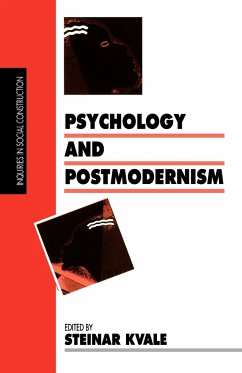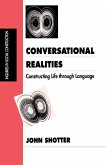This groundbreaking book is the first to explore the implications of postmodernist ideas for psychology. It examines central themes of postmodernism as they relate to psychology - for example, the nature of the self, locally situated rather than universal knowledge and the pivotal role of language in social life.
The contributors outline the new possibilities for psychology, setting theoretical reformulations alongside implications for psychological practice and method. The book presents critique as well as support for postmodern perspectives, from feminist critique of postmodern `deconstruction' to argument with the usefulness of sharp distinctions between a `modern' and `postmodern' psychology.
The contributors outline the new possibilities for psychology, setting theoretical reformulations alongside implications for psychological practice and method. The book presents critique as well as support for postmodern perspectives, from feminist critique of postmodern `deconstruction' to argument with the usefulness of sharp distinctions between a `modern' and `postmodern' psychology.
`This far-ranging exploration of the implications of a postmodern culture for psychology represents an international array of perspectives... it examines the relations of postmodernism to feminism, capitalism, methodology, the human sciences, the arts, epistemology, subjectivity, science and psychoanalysis. In doing so, it provides a portrait of psychology at the cutting edge of developments in the arts and humanities. Until recently, these developments had been simply ignored by psychology. Now, they are beginning to be bandied about by the appropriation of poorly understood phrases and ideas. This volume should add real depth to that dialogue' - The Humanistic Psychologist
`In this very readable volume, psychologists have gathered around them postmodernists from other disciplines to celebrate (albeit with a couple of dissenting voices) postmodernity' - British Journal of Psychology
`In this very readable volume, psychologists have gathered around them postmodernists from other disciplines to celebrate (albeit with a couple of dissenting voices) postmodernity' - British Journal of Psychology
`This far-ranging exploration of the implications of a postmodern culture for psychology represents an international array of perspectives... it examines the relations of postmodernism to feminism, capitalism, methodology, the human sciences, the arts, epistemology, subjectivity, science and psychoanalysis. In doing so, it provides a portrait of psychology at the cutting edge of developments in the arts and humanities. Until recently, these developments had been simply ignored by psychology. Now, they are beginning to be bandied about by the appropriation of poorly understood phrases and ideas. This volume should add real depth to that dialogue' - The Humanistic Psychologist
`In this very readable volume, psychologists have gathered around them postmodernists from other disciplines to celebrate (albeit with a couple of dissenting voices) postmodernity' - British Journal of Psychology
`In this very readable volume, psychologists have gathered around them postmodernists from other disciplines to celebrate (albeit with a couple of dissenting voices) postmodernity' - British Journal of Psychology








